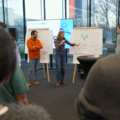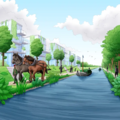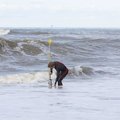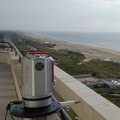Archive
22 January 2024
Students crafting flood resilience during hackathon

During the 182nd Dies Natalis of TU Delft, we delved into the theme of "Redesigning Deltas" to underline that we need rethink our approach to keep deltas around the world safe and liveable in the future. As part of the preceding Delta week, we organised a hackathon. On 9 January, students joined forces and took up the challenge: Crafting flood resilience in the Rotterdam region.
17 January 2024
TU Delft | Water for Impact at the UN Water Conference in New York

During the plenary opening of the UN2023 Water Conference on March 22nd in New York City, all representatives were asking for more awareness, discussions, and most importantly, #WaterAction. Researchers from the TU Delft | Water for Impact programmes were present in New York to do just that: share knowledge, activitate participants and bring together international water experts to accelerate the search for global solutions.
09 January 2024
Old times revived for climate adaptation

Extreme rainfall events are becoming more extreme and periods of drought are becoming more frequent. To keep the Dutch delta liveable, adaptations will be needed, such as extra water buffers. The Netherlands has a long history of struggle against water, but also makes eager use of it. What can we learn from our heritage? Erik Mostert, lecturer and researcher Water Management at TU Delft, developed several strategies for the province of South Holland to be more resilient to climate change. Inspiration for this came from Dutch heritage: tow barge canals.
09 January 2024
Student 'Quick Reaction' Team erected for field measurements in extreme weather events

08 January 2024
Unique permanent coastal observation detects minimal changes

A team of researchers from TU Delft has succeeded in long-term mapping of beach topography to within a few centimetres. The unique dataset provides insights into coastal changes for every hour, for three years. This data is important for dune maintenance and to keep the hinterland well protected. The methodology is also being used to monitor other coastlines and even glaciers. The data are open source and published in Nature, and the new methodology was also recently published.